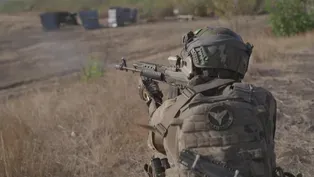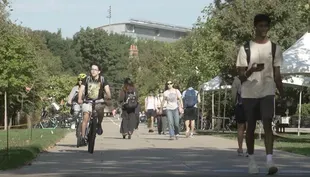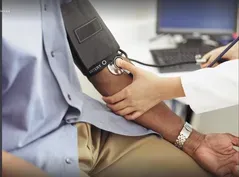
Races that will determine the balance of power in Congress
Clip: 10/30/2024 | 6m 6sVideo has Closed Captions
Pivotal races that will determine the balance of power in Congress
While all eyes are on the presidential race, there also are several key down-ballot races that will determine the balance of power in Congress. Republicans in the House hold a razor-thin majority but Democrats are honing in on a handful of races to help them win back the lower chamber. Lisa Desjardins reports.
Problems with Closed Captions? Closed Captioning Feedback
Problems with Closed Captions? Closed Captioning Feedback
Major corporate funding for the PBS News Hour is provided by BDO, BNSF, Consumer Cellular, American Cruise Lines, and Raymond James. Funding for the PBS NewsHour Weekend is provided by...

Races that will determine the balance of power in Congress
Clip: 10/30/2024 | 6m 6sVideo has Closed Captions
While all eyes are on the presidential race, there also are several key down-ballot races that will determine the balance of power in Congress. Republicans in the House hold a razor-thin majority but Democrats are honing in on a handful of races to help them win back the lower chamber. Lisa Desjardins reports.
Problems with Closed Captions? Closed Captioning Feedback
How to Watch PBS News Hour
PBS News Hour is available to stream on pbs.org and the free PBS App, available on iPhone, Apple TV, Android TV, Android smartphones, Amazon Fire TV, Amazon Fire Tablet, Roku, Samsung Smart TV, and Vizio.
Providing Support for PBS.org
Learn Moreabout PBS online sponsorshipGEOFF BENNETT: While all eyes are on the presidential race, there are also several key downballot races that will determine the balance of power in Congress.
AMNA NAWAZ: Republicans in the House hold a razor-thin majority, but Democrats are honing in on a handful of races to help them win back the Lower Chamber.
Lisa Desjardins has been following this all closely and joins us now.
So, Lisa, set the table for us in the House.
What do Democrats need to do to win control?
LISA DESJARDINS: Let's take a look.
Here is that razor-thin majority you were talking about right now.
Republicans control 221 seats in the House of Representatives, to Democrats controlling 214.
That includes current vacancies.
Now, both parties believe that due to redistricting and court battles that have happened since the last election, Republicans are poised to automatically pick up a net of one seat.
So let's color that in.
Given all of that, what do Democrats have to do, to answer your question?
They need to flip on net five seats across the country to regain control of the House.
GEOFF BENNETT: Well, how difficult will it be for Democrats to do that, Lisa?
LISA DESJARDINS: Right.
Let's take a look here.
This is what Cook Political Report, how they look at the map, of course, with our good Amy Walter.
So, I said they need to pick up five seats across the country.
Let's start out with this likely flip.
The Cook Political Report believes a seat in New York is likely to move from Republican to Democrat.
So if that happens, Democrats would just need to pick up four seats everywhere else.
Where would they do that?
The toss-up races favor Democrats.
Right now, 14 vulnerable Republicans are in toss-up races that could go either way compared with 11 Democrats.
That's something Democrats feel very good about.
However, if there is kind of a red wave, if there is Trump momentum at the top of the ticket, as you were talking about, then these other Democrats who are in slightly safer seats, they could be affected.
This is what Republicans hope for, to convert these sort of harder-to-get seats in this election in order to keep the House.
AMNA NAWAZ: Lisa, take us into a little bit more detail here.
Where is it that Republicans are most vulnerable?
LISA DESJARDINS: Right.
This is where it gets very interesting.
We have reported on this before, but a reminder that some of these seats, in fact, the biggest bulk of vulnerable Republicans are in Democratic states, five races in California Republicans, four races in New York vulnerable Republicans.
So that's nine seats right there.
Remember, Democrats just want to flip four at this point.
So of these nine, something else that's important about them, eight of them are in districts that Joe Biden won.
These are Republicans kind of running against the wind, trying to outrun kind of their district and get some split-ticket voters.
I want to look at one of these districts in particular.
This is New York's Fourth District.
Where is it?
Hello, Long Island right there, Nassau County.
This is a rematch between current Congressman Anthony D'Esposito, the Republican -- he's a former police detective -- against Laura Gillen, attorney, also a former town supervisor.
This is a place where Democrats think abortion is bolstering their chances.
And this came up prominently in their debate.
Laura Gillen talked about her personal story where she had a fetus die in her second trimester.
She told that story during the debate.
LAURA GILLEN (D), New York Congressional Candidate: I needed to have a procedure called a D&E.
And that procedure saved my life.
We must protect reproductive freedom in this country.
It is not a state's right.
It's a human right.
LISA DESJARDINS: D'Esposito says he opposes a national ban and that he has been misconstrued as extreme.
He talked in particular about something that's been in ads in the district, his position that a physician should have to attempt to give lifesaving care to a fetus or baby that survives an abortion.
He says that that too has been misconstrued.
REP. ANTHONY D'ESPOSITO (R-NY): The law says that the doctor has to provide every bit of medical care to that living baby that was just born.
If the care isn't provided to keep it alive, then, yes, the doctor would be responsible.
That doesn't seem to me as extremism.
It seems to me that that's common sense.
LISA DESJARDINS: One more note about this race.
There was a bombshell report that D'Esposito paid and hired his mistress to work in his congressional office.
He has not denied that, but he has said he did nothing wrong.
GEOFF BENNETT: So, Lisa, what about Democrats?
Where are Democrats potentially in trouble?
LISA DESJARDINS: There are absolutely vulnerable Democrats, and a lot of them in swing states, two races in Pennsylvania, two in Michigan, also Democrats on defense in Maine, Virginia, Colorado, all over the map.
Let's look at one particular race here.
This is Pennsylvania's Seventh District.
Look at that.
It's a swing area.
Susan Wild has been in office there since 2018.
Ryan Mackenzie, rising Republican star, challenging her.
Now, in their debate, abortion did come up, but the economy is a bigger issue here.
In their debate, these two went back and forth over who's to blame for cost of living issues right now.
Is it the Biden administration or is it corporate America?
RYAN MACKENZIE (R), Pennsylvania Congressional Candidate: Susan Wild has voted for every single plank of Bidenomics.
That massive overspending in Washington, D.C., is what has caused the inflation and the high prices that we are all struggling with.
And so we need to rein in that wasteful spending in Washington, D.C., and that's something that I would do if elected to Congress.
REP. SUSAN WILD (D-PA): I do my own grocery shopping.
I pump my own gas.
I'm very aware of prices.
And although I'm happy that gas prices seem to be coming down, believe me, I understand what people have been going through.
People at the top, the 1 percent, they're doing just fine.
So we have got to make sure that we are cracking down on corporations that are price gouging.
LISA DESJARDINS: Now, this is just one of the roughly four dozen races that will determine control of the House.
And, also, in a presidential year where we have got a real toss-up here, guys, you know control the House means, will the president have someone that works with them, or will it be a balance, a check on that presidential power?
GEOFF BENNETT: Lisa Desjardins, thanks, as always.
We appreciate it.
LISA DESJARDINS: You're welcome.
Americans in Ukraine on how election could change war
Video has Closed Captions
American volunteers fighting in Ukraine share views on how election could affect the war (7m 8s)
Harris, Trump campaign in N.C. with less than a week to go
Video has Closed Captions
Harris and Trump swing through North Carolina with less than a week of campaigning left (5m 8s)
How a college degree is one of the best voter predictors
Video has Closed Captions
How a college degree is one of the best predictors of which candidate voters support (10m 3s)
A look at Harris’ and Trump’s positions on healthcare policy
Video has Closed Captions
A look at Harris’ and Trump’s positions on healthcare policy (6m 40s)
New airline refund rules could ease travel hassles
Video has Closed Captions
New airline refund rules could ease travel hassles for American passengers (4m 32s)
'Purpletown' documents what people still have in common
Video has Closed Captions
'Purpletown' documents what people in politically divided areas still have in common (4m 51s)
Providing Support for PBS.org
Learn Moreabout PBS online sponsorshipMajor corporate funding for the PBS News Hour is provided by BDO, BNSF, Consumer Cellular, American Cruise Lines, and Raymond James. Funding for the PBS NewsHour Weekend is provided by...

















